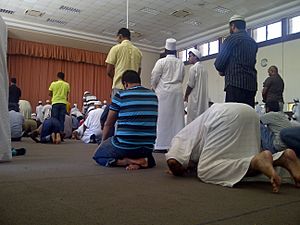Sunnah salat facts for kids
Sunnah salat (which means "optional prayers" in Arabic) are special prayers that Muslims can choose to perform. They are done in addition to the five daily prayers, which are compulsory for all Muslims. Think of Sunnah prayers as extra credit or bonus points in your spiritual journey! They help Muslims feel closer to God and follow the example of Prophet Muhammad.
Contents
What Are Sunnah Prayers?
Sunnah prayers are not required, but they are highly recommended. The word "Sunnah" refers to the teachings and practices of Prophet Muhammad. By performing these extra prayers, Muslims aim to imitate the Prophet's devotion and gain more rewards from God. These prayers can be done at almost any time of the day, except for a few specific times when prayer is not allowed, like during sunrise or sunset.
Why Do Muslims Perform Sunnah Prayers?
Muslims perform Sunnah prayers for several reasons:
- To earn more rewards: Each prayer brings a Muslim closer to God and earns them good deeds.
- To make up for mistakes: If there were any small errors or distractions during the compulsory prayers, Sunnah prayers can help make up for them.
- To follow Prophet Muhammad's example: The Prophet Muhammad regularly performed these optional prayers, showing their importance.
- To feel closer to God: Spending extra time in prayer helps Muslims strengthen their connection with God and find peace.
Types of Sunnah Prayers
There are many different types of Sunnah prayers, each with its own time and purpose. Here are some common ones:
Rawatib Prayers
These are Sunnah prayers that are performed right before or right after the five daily compulsory prayers. They are often called "regular" Sunnah prayers because they are done consistently.
- Before Fajr (Dawn Prayer): Two units of prayer (rak'ahs) before the compulsory Fajr prayer. These are considered very important.
- Before and After Dhuhr (Midday Prayer): Four units before and two units after the compulsory Dhuhr prayer.
- After Maghrib (Sunset Prayer): Two units after the compulsory Maghrib prayer.
- After Isha (Night Prayer): Two units after the compulsory Isha prayer.
Tahajjud Prayer
Tahajjud is a special night prayer performed after waking up from sleep, usually in the last third of the night before Fajr. It is considered one of the most rewarding prayers because it requires extra effort to wake up when others are sleeping. Muslims often use this time to ask God for their needs and forgiveness.
Duha Prayer
The Duha prayer is performed in the late morning, after sunrise and before Dhuhr. It can be anywhere from two to twelve units of prayer. This prayer is often called the "forenoon prayer" and is a way to thank God for the blessings of the day.
Tarawih Prayer
Tarawih prayers are special night prayers performed only during the holy month of Ramadan. They are usually done in congregation (with a group) in mosques after the Isha prayer. Tarawih prayers are a beloved part of Ramadan, where Muslims stand for long periods reciting the Quran.
Salat al-Istikhara
This is a special prayer performed when a Muslim needs guidance from God about an important decision. After performing two units of prayer, the person recites a specific supplication (dua) asking God to guide them to what is best. It's like asking for divine advice!
Salat al-Kusuf and Khusuf
These are prayers performed during a solar eclipse (Kusuf) or a lunar eclipse (Khusuf). They are done to remember God's power and greatness during these natural events.
Sunnah prayers are a beautiful part of Islamic practice, offering Muslims many opportunities to connect with God beyond their daily duties.
 | Roy Wilkins |
 | John Lewis |
 | Linda Carol Brown |


